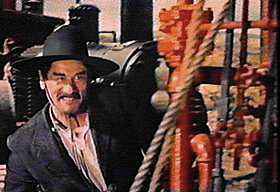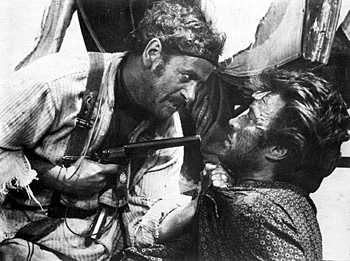|
Iíll ask you about working with John Huston, then.
John Huston was a superb master. He knew how to make good films. I did three things with him. One is called Independence. It plays in Philadelphia, for free. Itís been playing there for 25 years. I played Ben Franklin. The other one was -- I acted in a movie with him, but we had no scenes together -- called Winterkill. If you can get a copy of it, you should see it. And then the first was The Misfits, which I enjoyed very much, with Marilyn and Gable.

Eli Wallach during the train wreck sequence
from How the West Was Won.
You worked with director Martin Ritt on a couple of films, 1962ís Adventures of a Young Man and 1987's Nuts.
Right. Nuts, yeah. Well, Ritt did, you know, Norma Rae. Ritt did a lot of wonderful movies. Hud. Heís an excellent director. And that movie was underrated -- Nuts -- because it deals with a terrible subject, but itís very well done. And he assembled quite an acting team, with [Richard] Dreyfuss and [Barbra] Streisand and [Karl] Malden and [Maureen] Stapleton and Bob Webber, and I forget who played the judge -- oh yeah, James Whitmore. A cast of pros.
You had a memorable scene in Carl Foremanís The Victors (1963), where you play a character, Sgt. Craig, whose face is damaged in the war, and one of the other characters comes to see you, not knowing what happened, and you start yelling at him.
Yeah. His face was shot. Yes, and I say, "Shut the door! Close the door!"
You worked on the famous train wreck sequence of the 1963 Cinerama epic How the West Was Won, didnít you?
There were three directors -- George Marshall, John Ford and Henry Hathaway. I did two movies with Hathaway. One was called Seven Thieves, with Edward G. Robinson and Rod Steiger, and Joan Collins. And then I did How the West Was Won. I said, "Can I read the script?" Iím in New York. He sends me two pages. I said, "What do you want me to do?" He says, "Youíre gonna hold up a train." I said, "Well, whereís the character?" He says, "Youíre the character." He says, "Itís gonna take me three weeks to shoot that scene, and when itís finished, the audience will applaud." I said, "Yeah?" He says, "Yeah. So get your ass out here."
When I was out there, I was asked to do a movie by an Italian director named Leone. So, I went to Hathaway and I said, "He wants me to play a Mexican bandit. I donít know." He said, "Come with me." [He] took me to a western costume company and found me a hat and boots and a pair of chaps that went from the knee down. Itís a wonderful conception. And when Leone saw me, he said it was wonderful. He loved it.

Eli Wallach and Clint Eastwood in
The Good, the Bad and the Ugly.
Speaking of The Good, the Bad and the Ugly (1967), I understand that you speak Italian, so you were able to communicate well with the director, Sergio Leone.
In those days, you know, there was no direct sound. It all was dubbed. So, you spoke your language, and the other actors spoke their language. Spanish, Italian, French, German, Chinese, whatever they spoke. And then it was all dubbed in.
And I enjoyed working with Clint, who said to me, "When I finish this picture, Iím not gonna make any more Italian movies. Iím gonna make my own." So, for thirty some odd years, heís been making his own, and Iíve not been in one of them! But I like him.
Did Leone ever discuss making a film version of Don Quixote with you?
No. I played [it] with Lee J. Cobb on television. I played Sancho Panza. It was called I, Don Quixote. They made Man of La Mancha out of it. I could have played Sancho Panza.
You made several "Spaghetti Westerns" after doing The Good, the Bad and the Ugly. You must have enjoyed working on those.
[I did] a half a dozen of them. Well, I was getting a lot of money then, and I wasnít getting any Hollywood films, so I just did those. Iíd always do a play in between. Whenever I ran low on funds, Iíd always rush off to do a movie somewhere.
page 3 of 4
 
Go to Eli Wallach filmography.
© 1998 Paul Riordan. All rights reserved.
|


